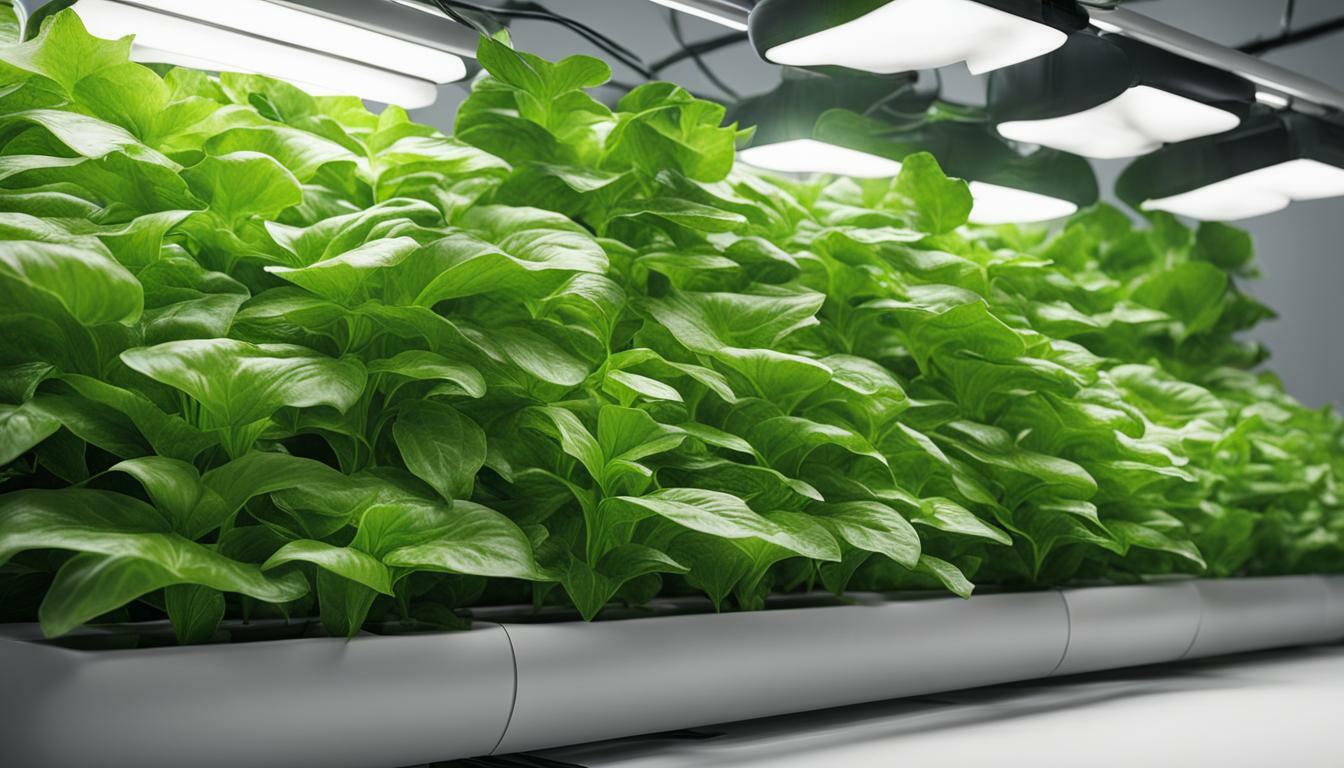Unlock a world of green living with hydroponic garden vertical systems that revolutionize how we grow our food. With these innovative systems, you can cultivate your own produce at home without the need for traditional soil-based gardening. Hydroponic garden vertical systems offer numerous benefits, including enhanced nutrition, flavorful harvests, and sustainable practices.
Key Takeaways:
- Hydroponic garden vertical systems provide a revolutionary way to grow your own food at home.
- These systems eliminate the need for soil and maximize the efficiency of nutrient absorption in plants.
- Hydroponic produce is rich in vitamins, minerals, and antioxidants, offering superior nutrition.
- With hydroponic gardening, you can enjoy exquisite flavors and year-round harvests.
- These systems are environmentally friendly, using less water and land while reducing carbon emissions.
- Embrace the hydroponic revolution at home and experience the satisfaction of self-sufficiency.
- When choosing a hydroponic system, consider your space, plant types, and personal preferences.
- Follow expert tips for successful hydroponic gardening, including proper lighting, nutrient management, and pest control.
- By cultivating your own hydroponic garden, you can enjoy the freshest, most flavorful produce while positively impacting your well-being and the planet.
Historic Roots and Modern Growth of Hydroponic Gardening
Hydroponics has a rich history dating back to ancient civilizations like the Hanging Gardens of Babylon and Aztec floating gardens. These early examples of soilless cultivation prove that humans have long been experimenting with alternative methods of growing plants. In the present day, hydroponics has experienced a surge in popularity and accessibility thanks to innovative home systems.
Modern hydroponic gardening systems have made this technique available to everyone, revolutionizing how we grow our food. These systems eliminate the need for soil, instead relying on a nutrient-rich water solution that provides plants with everything they need to thrive. With the use of vertical farming techniques, hydroponic gardens can be established in smaller spaces, allowing urban dwellers and those with limited yard space to enjoy the benefits of homegrown produce.
One of the key advantages of hydroponic gardening is the efficient absorption of nutrients by the plants. Without the presence of soil, plants can absorb nutrients directly from a perfectly balanced solution, maximizing their intake and boosting their nutritional value. This controlled environment also ensures that hydroponically grown produce is rich in vitamins (such as vitamin C and B-complex) and antioxidants (like lycopene and beta-carotene).
Hydroponics offers a sustainable and controlled method of growing plants, free from the use of chemical pesticides. By eliminating the need for soil, hydroponic gardens reduce the risk of pests and diseases and provide a safer, healthier food source. Additionally, hydroponics uses significantly less water compared to traditional farming methods, making it a more water-efficient and environmentally friendly way of growing food.
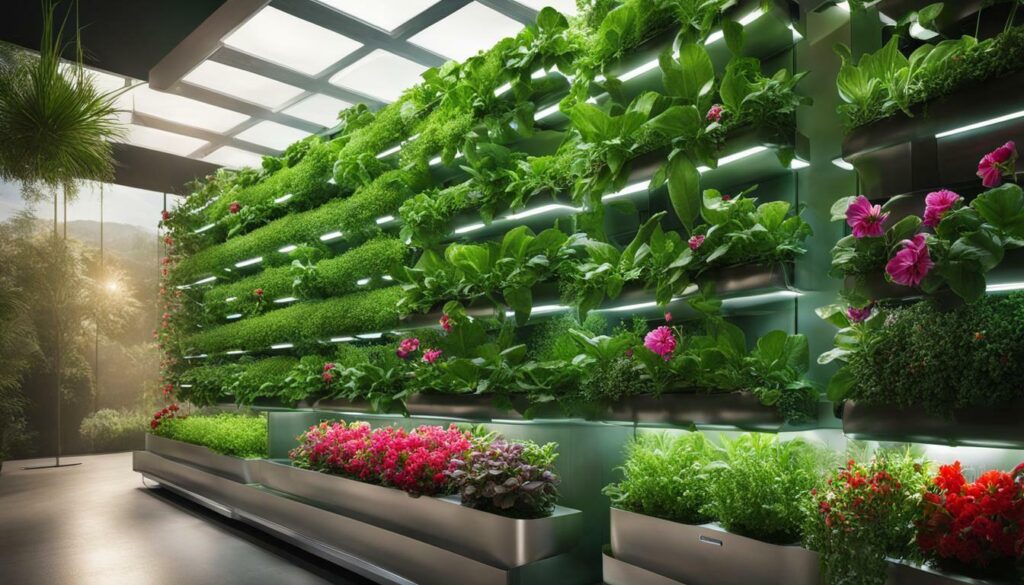
Hydroponic Gardening in Ancient Civilizations
The use of hydroponic gardening can be traced back to ancient civilizations, such as the Hanging Gardens of Babylon and Aztec floating gardens. These early examples demonstrate the ingenuity of our ancestors in cultivating plants without relying on traditional soil-based methods.
Modern Innovations in Hydroponic Gardening
In recent years, hydroponic gardening has experienced a resurgence in popularity, thanks to innovative home systems that make it accessible to everyone. These systems eliminate the need for soil and allow plants to thrive in a nutrient-rich water solution. Vertical farming techniques further enhance the efficiency and sustainability of hydroponic gardening, making it possible to grow a wide variety of plants in smaller spaces.
Nutritional Benefits of Hydroponically Grown Produce
Hydroponic gardening offers unique nutritional advantages. Plants grown hydroponically have superior nutrient absorption, as they can take up nutrients directly from a balanced solution. This results in plants with higher nutritional value, including increased levels of vitamins (such as vitamin C and B-complex) and antioxidants (like lycopene and beta-carotene).
Sustainability and Environmental Benefits
Hydroponic gardening is a sustainable and eco-friendly method of growing food. By eliminating the need for soil, hydroponic gardens reduce the use of chemical pesticides, making them a safer and healthier option. Additionally, hydroponics uses significantly less water compared to traditional farming methods, contributing to water conservation efforts. The controlled environment of hydroponic gardens also optimizes land use and reduces the carbon footprint associated with transportation and storage of produce.
Conclusion
Hydroponic gardening has a rich history dating back to ancient civilizations, and modern innovations have made this technique accessible to everyone. By embracing hydroponics, we can enjoy nutrient-rich produce, reduce our environmental impact, and create a sustainable future. Whether you have limited space or simply want to explore a new way of gardening, hydroponics offers a revolutionary approach to growing food.
Nutritional Superiority of Hydroponic Produce
Hydroponic plants have a nutritional edge due to their efficient nutrient absorption from a perfectly balanced solution, resulting in higher nutritional value. This soilless cultivation method provides plants with direct access to essential nutrients, eliminating the need for nutrient uptake through soil. As a result, hydroponic plants can absorb nutrients more efficiently, maximizing their intake and enhancing their nutritional composition.
In addition to efficient nutrient absorption, hydroponic produce is packed with abundant vitamins and minerals. The controlled environment of hydroponic systems optimizes the development of these vital nutrients, resulting in a rich and diverse array of vitamins and minerals in the harvested produce.
Hydroponic fruits and vegetables are particularly rich in vitamins such as vitamin C and B-complex vitamins, which play crucial roles in supporting overall health and well-being. These vitamins contribute to immune function, energy metabolism, and the maintenance of healthy skin and hair. Antioxidants such as lycopene and beta-carotene are also found in high quantities in hydroponically grown produce, providing potent antioxidant benefits that help protect the body against oxidative stress and reduce the risk of chronic diseases.
Moreover, hydroponic cultivation eliminates the need for chemical pesticides, ensuring that the produce is free from harmful residues. By growing your own hydroponic produce at home, you can enjoy pesticide-free and healthier food options for you and your family.
Table: Comparison of Nutritional Benefits
| Nutrient | Hydroponic Produce | Conventional Produce |
|---|---|---|
| Vitamin C | Higher amounts | Lower amounts |
| Vitamin B12 | Higher amounts | Lower amounts |
| Lycopene | Higher amounts | Lower amounts |
| Beta-Carotene | Higher amounts | Lower amounts |
| Antioxidants | Rich in various antioxidants | Varies |
“Hydroponic plants have a nutritional edge due to their efficient nutrient absorption from a perfectly balanced solution, resulting in higher nutritional value.”
Hydroponic gardening provides a superior nutritional profile for fruits and vegetables. By growing your own hydroponic produce, you can ensure that you and your family are consuming nutrient-dense and pesticide-free food that supports optimal health and well-being.
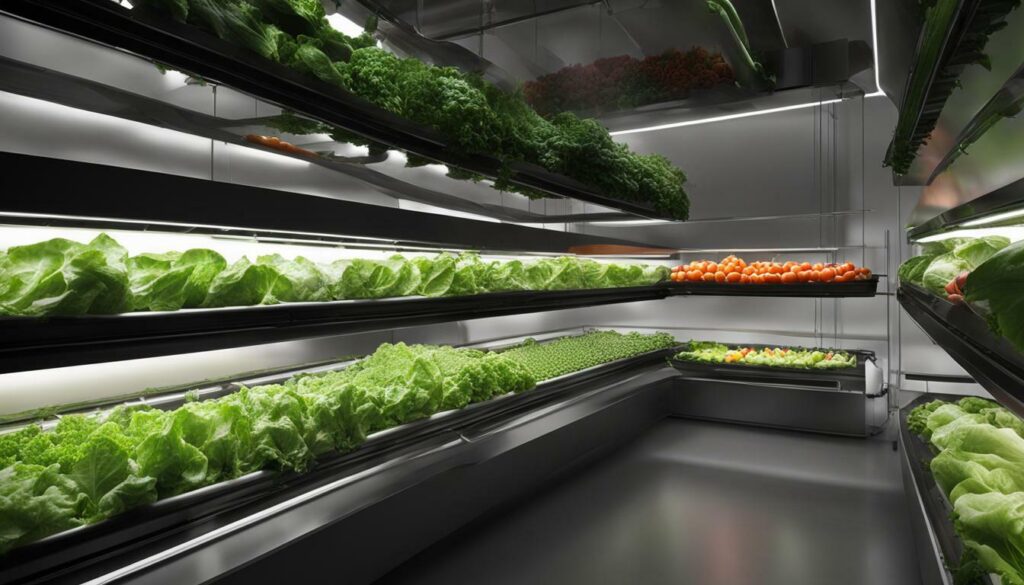
Sources:
- “The Nutritional Superiority of Hydroponic Produce.” Hydroponics Simplified, www.hydroponicsimplified.com/nutritional-superiority-hydroponic-produce.
- “The Nutritional Benefits of Hydroponic Gardening.” The Garden Guy, www.thegardenguy.org/nutritional-benefits-hydroponic-gardening.
Flavorful Rewards of Hydroponic Gardening
Experience the exquisite flavor of hydroponically grown plants, which reach their full potential and provide a continuous supply of fresh produce throughout the year. Hydroponics allows plants to thrive in controlled environments, enhancing their flavors and nutritional value. Let’s explore the bountiful rewards that await you in your own vertical vegetable garden.
Year-Round Harvest
With hydroponic gardening, there are no seasonal limitations. You can enjoy a diverse array of fruits, vegetables, and herbs throughout the year. Say goodbye to waiting for the right season to savor your favorite crops. Whether it’s juicy tomatoes, crisp cucumbers, or fragrant herbs, your hydroponic garden can provide a constant supply of delicious produce, ensuring that your meals are always bursting with flavor.
Unsurpassed Taste
Hydroponically grown plants have the advantage of receiving optimal nutrition and water, resulting in exceptional taste. With nutrients delivered directly to the roots, plants can focus their energy on developing intense flavors. The absence of soil also eliminates the risk of soil-borne diseases, ensuring that your plants thrive with robust flavors, free from any earthy or bitter undertones. Prepare to indulge in the unmatched taste of your hydroponically cultivated vegetables.
Varied Cultivation Possibilities
Hydroponic gardening opens up a world of possibilities for cultivating a wide range of plants. From leafy greens like spinach and kale to root vegetables like carrots and beets, hydroponics allows you to grow a variety of crops. Embrace the versatility of your vertical vegetable garden and experiment with different plant types to create a diverse and flavorful harvest.
Table: Recommended Plants for Hydroponic Gardening
| Plant Type | Example Plants |
|---|---|
| Leafy Greens | Spinach, Lettuce, Kale |
| Herbs | Basil, Cilantro, Mint |
| Tomatoes | Cherry Tomatoes, Beefsteak Tomatoes |
| Peppers | Bell Peppers, Jalapenos |
| Root Vegetables | Carrots, Radishes, Beets |
Unlock the flavorful rewards of hydroponic gardening and elevate your culinary creations with homegrown produce that surpasses store-bought alternatives. The year-round harvest, exceptional taste, and the ability to grow a variety of crops make hydroponic gardening an enticing choice for flavor enthusiasts and health-conscious individuals alike. Embrace the green revolution and savor the flavors of your hydroponic garden.
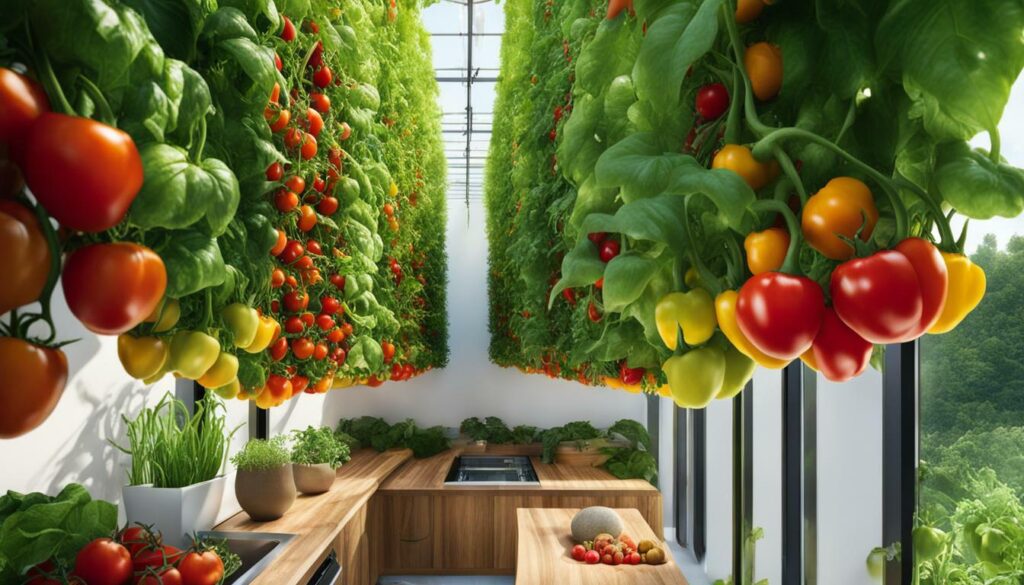
Sustainability Superpowers of Hydroponic Garden Vertical Systems
Embrace hydroponics as a sustainability superhero, with water-saving abilities, optimized land use, and a reduced carbon footprint compared to traditional farming. Hydroponic garden vertical systems offer numerous environmental benefits that make them an ideal choice for conscious home gardeners.
Water Warriors: Hydroponic systems are champions in water conservation, using up to 90% less water than traditional farming methods. With their efficient water usage, these systems help combat water scarcity and promote sustainable water management practices.
Space Wizards: Vertical hydroponic garden systems are perfect for those with limited space. These compact setups allow you to grow a thriving garden in even the smallest areas. By utilizing vertical space, you optimize land use and maximize your growing potential, making the most of every square inch.
Carbon Crusaders: By choosing hydroponic gardening, you contribute to reducing carbon footprints. Growing your own produce at home eliminates the need for transportation from farms to stores, reducing emissions and promoting a more sustainable future. You become an active participant in the fight against climate change.
Environmental Impact Comparison
| Hydroponic Garden Vertical Systems | Traditional Farming | |
|---|---|---|
| Water Usage | Uses up to 90% less water | High water consumption |
| Land Use | Optimizes land use through vertical gardening | Requires extensive land for crop cultivation |
| Carbon Footprint | Reduces transportation emissions | High emissions from transportation |
Embracing hydroponic garden vertical systems not only allows you to enjoy fresh, nutritious produce but also empowers you to make a positive difference for the planet. As you cultivate your own hydroponic garden, you become an advocate for sustainable food production, conserving water, optimizing land use, and minimizing carbon emissions. Let’s join forces and create a greener future with hydroponics.
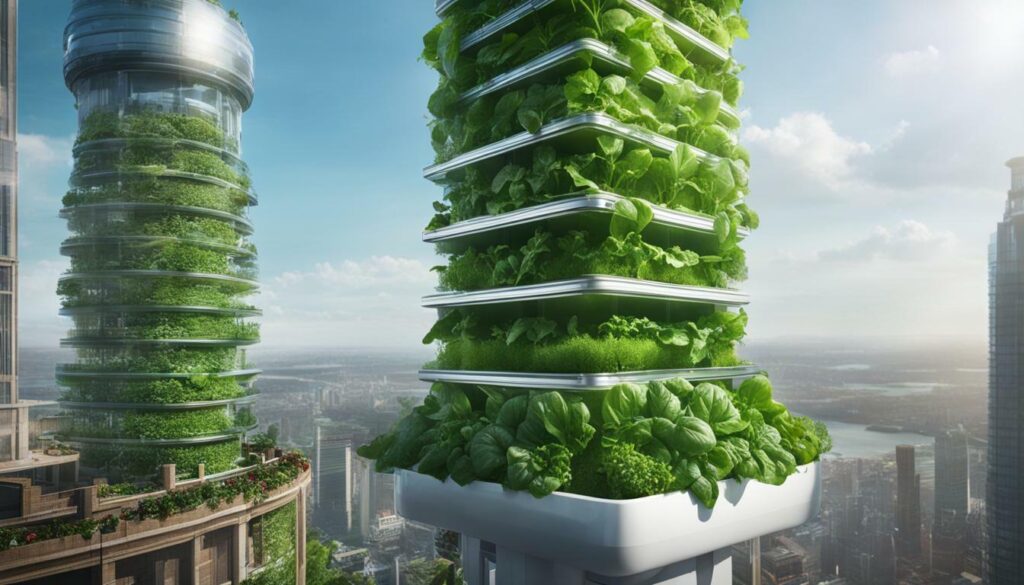
As Thomas Jefferson once said, “Cultivators of the earth are the most valuable citizens.” By adopting hydroponic gardening, you become a valuable citizen actively contributing to a sustainable future. Join the hydroponic revolution and unlock the green living potential within your home.
Embracing the Hydroponic Revolution at Home
Take control of your food supply and embrace the hydroponic revolution at home, where you can enjoy the freshest, most flavorful produce and the satisfaction of growing your own. Hydroponic gardening offers a multitude of benefits, from nutritional superiority to year-round harvest capabilities. With modern indoor vertical garden systems, you can create a thriving garden in even the smallest spaces, making it accessible to everyone.
Imagine having a garden that requires up to 90% less water than traditional farming methods. Hydroponics is the ultimate water-saving hero, making it an excellent choice for sustainable living. By optimizing land use with compact setups and vertical systems, you can contribute to water conservation efforts and reduce your carbon footprint. Grow your own hydroponic garden and become a true eco-warrior, working towards a greener and more sustainable future.
Unlocking Nutritious Delights
One of the key advantages of hydroponic gardening is the nutritional superiority of the produce. With efficient nutrient absorption directly from a balanced solution, hydroponic plants maximize their intake and boost their nutritional value. This controlled environment also ensures that hydroponic produce is abundant in vitamins, such as vitamin C and B-complex, as well as antioxidants like lycopene and beta-carotene. By growing your own hydroponic garden at home, you can have access to pesticide-free, nutrient-rich produce that promotes your health and well-being.
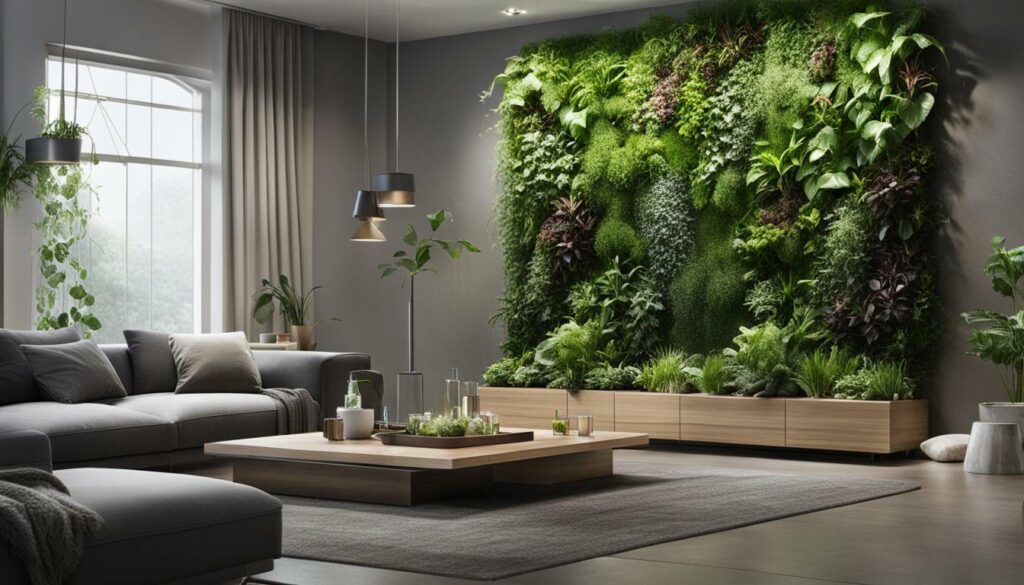
Year-Round Flavors
Not only does hydroponic gardening offer nutritional benefits, but it also delivers exceptional taste. The controlled environment and optimal conditions allow hydroponically grown plants to reach their flavor potential. You’ll experience the intense and fresh flavors of fruits, vegetables, and herbs that surpass store-bought produce. Plus, with hydroponics transcending seasonal limitations, you can enjoy a continuous supply of diverse produce throughout the year, ensuring that your meals are always packed with flavor.
Getting Started
Ready to embark on your hydroponic journey? Choosing the right hydroponic system for your needs is crucial. Consider factors such as available space, types of plants you want to grow, and personal preferences. There are various options available, from vertical hydroponic garden systems to indoor setups. Selecting the right system will help you optimize your garden’s performance and ensure successful cultivation.
Once you’ve chosen your hydroponic system, it’s important to follow expert tips for success. Proper lighting, nutrient management, and pest control are essential for achieving optimal growth and ensuring a thriving garden. With the right knowledge and techniques, you can become a proficient hydroponic gardener and enjoy the abundant rewards of growing your own fresh, organic produce.
Take control of your food supply and embrace the hydroponic revolution at home. By cultivating your own hydroponic garden, you not only gain access to nutritious, flavorful produce but also contribute to water conservation efforts and create a more sustainable future. Start your soilless cultivation journey today and experience the joy of gardening while positively impacting your well-being and the planet.
Choosing the Right Hydroponic System for Your Needs
When choosing a hydroponic system, consider factors such as available space, preferred plant types, and your personal gardening preferences to find the perfect fit. With a wide variety of options available, it’s important to select a system that aligns with your goals and resources.
Space Considerations
One of the key factors to consider is the amount of space you have available for your hydroponic garden. If you have limited space, vertical hydroponic garden systems are a great choice. These systems utilize vertical space efficiently, allowing you to grow a large number of plants in a small footprint. They are perfect for balconies, patios, and even indoor spaces.
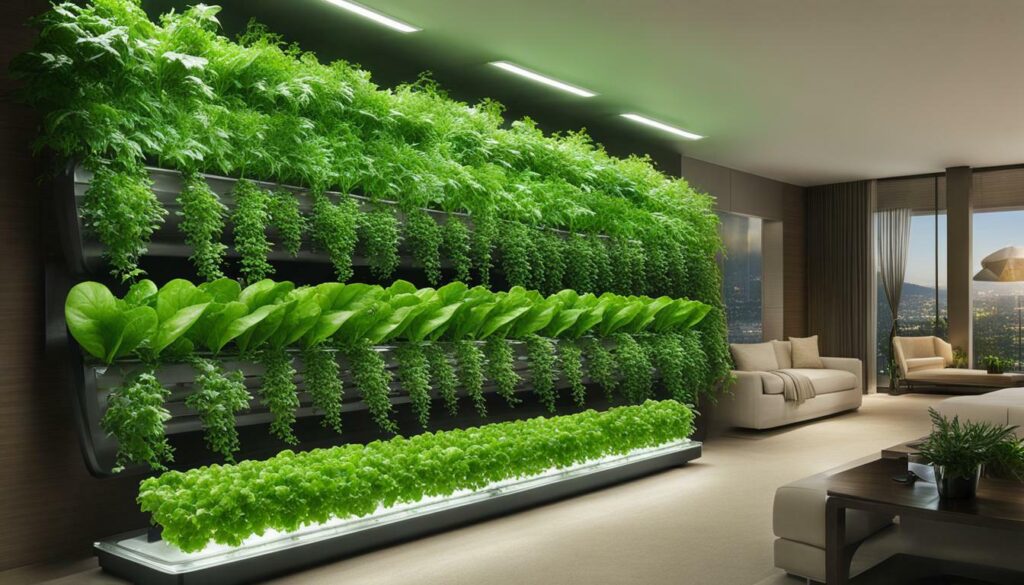
Plant Types
Consider the types of plants you want to grow when selecting a hydroponic system. Different plants have different nutrient and space requirements. Leafy greens like lettuce and herbs thrive in most hydroponic systems, while larger plants like tomatoes and peppers require more vertical space for their growth. Research the specific needs of each plant type to ensure compatibility with your chosen system.
Gardening Preferences
Think about your personal gardening preferences when choosing a hydroponic system. Some systems are more hands-on, requiring regular monitoring and adjustments, while others are fully automated, taking care of the plants’ needs on their own. Consider how much time and effort you are willing to invest in your hydroponic garden and choose a system that matches your preferences.
By carefully considering factors such as space, plant types, and personal preferences, you can choose the right hydroponic system for your needs. Whether you opt for a compact vertical garden or a larger automated system, hydroponics offers a sustainable and efficient way to grow your own fresh produce at home.
| System Type | Space Requirement | Plant Types | Gardening Preferences |
|---|---|---|---|
| Aeroponics | Requires less space | Wide variety of plants | Requires regular monitoring and adjustments |
| Hydroponics | Compact vertical systems available | Leafy greens, herbs | Options for both manual and automated systems |
| Other Hydroponic Systems | Varies depending on system | Wide variety of plants | Options for both manual and automated systems |
In conclusion, choosing the right hydroponic system involves considering factors such as available space, preferred plant types, and personal gardening preferences. Whether you opt for an aeroponic system, a compact vertical hydroponic system, or another type of hydroponic system, the key is to find a system that suits your needs and allows you to enjoy the benefits of soilless gardening.
Tips for Successful Hydroponic Gardening
Achieve success in hydroponic gardening with these expert tips, covering important aspects such as lighting, nutrient management, and pest control. Whether you’re a beginner or experienced gardener, these strategies will help you maximize your yields and maintain healthy plants throughout the growing season.
Lighting
Proper lighting is crucial for the growth and development of hydroponic plants. Choose the right type of grow lights based on the specific needs of your crops. LED grow lights are energy-efficient and provide the ideal spectrum for all stages of plant growth. Position the lights at the appropriate distance from the plants to ensure they receive adequate light without causing heat stress.
Nutrient Management
Hydroponic plants rely on nutrient solutions for their growth. Regularly monitor and adjust the nutrient levels in your system to ensure optimal plant health. Use high-quality hydroponic nutrients that contain all the essential elements in the right proportions. Follow the manufacturer’s instructions for dosing and be mindful of any specific nutrient requirements for different plant varieties.
Pest Control
Preventing and managing pests is essential in hydroponic gardening. Implement integrated pest management (IPM) strategies to keep pests at bay without relying on harmful chemical pesticides. Use physical barriers such as insect mesh or sticky traps to prevent pest entry. Regularly inspect your plants for signs of pests and take immediate action if infestations occur. Consider natural pest control methods like introducing beneficial insects or using organic pest repellents.
By implementing these tips and techniques, you can ensure a successful hydroponic garden and enjoy the bountiful harvest of fresh, nutritious produce all year round.
| Expert Tips for Successful Hydroponic Gardening |
|---|
| Choose the right type of grow lights for optimal plant growth. |
| Monitor and adjust nutrient levels in your system to support plant health. |
| Implement integrated pest management strategies for effective pest control. |
“Proper lighting, nutrient management, and pest control are key to achieving success in hydroponic gardening.” – Garden Expert
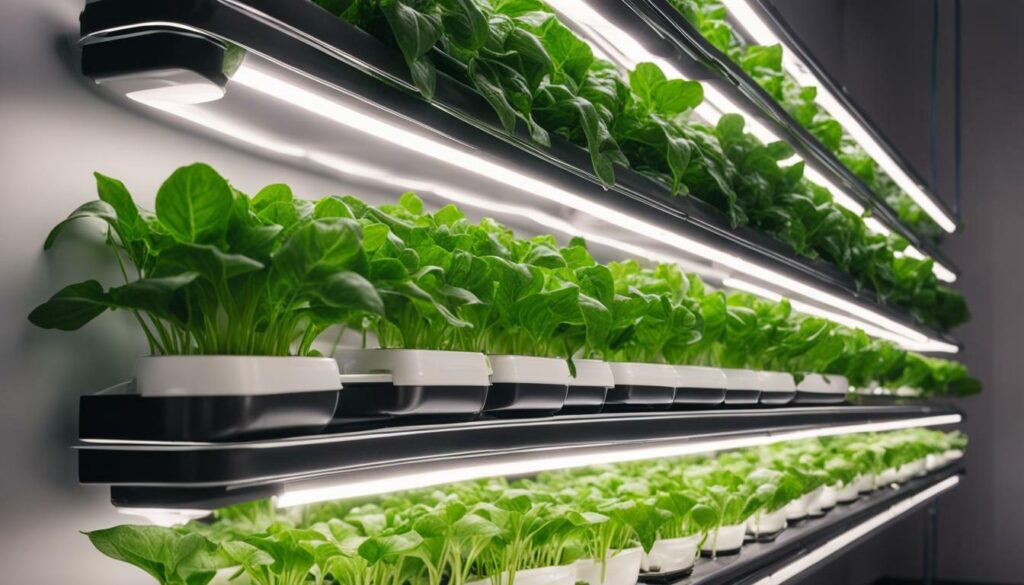
Conclusion
Embrace the green revolution with hydroponic garden vertical systems and unlock a world of sustainability, nutrition, and flavor right in your own home. With hydroponics, you can tap into the wonders of soilless gardening and enjoy a host of benefits that traditional gardening methods simply can’t match.
By growing your own produce using hydroponic systems, you not only have control over the quality and safety of the food you consume but also contribute to a more sustainable future. Hydroponics allows for efficient nutrient absorption, resulting in produce that is packed with vitamins and minerals, ensuring you and your family receive optimal nutrition.
When it comes to taste, hydroponically grown plants shine. Their exceptional flavors surpass those of store-bought alternatives, and with year-round harvest capabilities, you can savor fresh and delicious produce regardless of the season. Plus, the compact and vertical nature of these systems makes them ideal for even the smallest spaces, allowing anyone to become a green thumb.
But the benefits of hydroponics go beyond the plate. By utilizing up to 90% less water than traditional farming, hydroponic garden vertical systems are water warriors, conserving this precious resource. Additionally, with optimized land use and reduced carbon footprints, hydroponics is a sustainability superhero, making a positive impact on the environment.
So why wait? Join the hydroponic revolution and cultivate your own garden at home. With a wide range of hydroponic systems available, you can choose the one that suits your needs and preferences. From indoor vertical gardens to hydroponic tower systems, there is a solution for everyone.
And to ensure your hydroponic gardening success, remember to follow expert tips like providing proper lighting, managing nutrients effectively, and implementing pest control measures. With a little knowledge and effort, you can reap the rewards of a thriving hydroponic garden.
In conclusion, hydroponic garden vertical systems offer a pathway to a greener and healthier lifestyle. By growing your own fresh and organic produce at home, you not only enjoy incredible flavors and nutritional superiority but also make a positive impact on the environment. So why not embark on this green journey and unlock the potential of hydroponic gardening in your own home?
What are the Benefits of Using a Vertical Hydroponic Garden System for Green Living?
A growing vertical hydroponic garden system offers several benefits for green living. It maximizes space, reduces water usage, and allows for year-round cultivation. The system is also easy to maintain and provides a higher yield compared to traditional gardening methods. Overall, it’s a sustainable and efficient way to grow plants.
What are the Benefits of Hydroponic Garden Vertical Systems for Green Living?
Discover the benefits of a superior indoor hydroponic garden. Vertical hydroponic systems maximize space, conserve water, and reduce soil erosion. They also produce higher crop yields, and are perfect for urban living. Embrace sustainable living with a hydroponic garden for fresh, organic produce right at your fingertips.
FAQ
Q: What is hydroponic gardening?
A: Hydroponic gardening is a technique of growing plants without soil. Instead, plants are grown in a nutrient-rich water solution, allowing for efficient nutrient absorption and optimal plant growth.
Q: Are hydroponically grown plants more nutritious?
A: Yes, hydroponically grown plants have been found to be more nutritious. They absorb nutrients directly from a balanced solution, maximizing their intake and enhancing their nutritional value.
Q: Do hydroponic plants taste better than store-bought produce?
A: Yes, hydroponically grown plants typically have a more intense and fresh flavor compared to store-bought produce. The controlled environment of hydroponic systems allows plants to reach their flavor potential.
Q: Can hydroponic gardening be done in small spaces?
A: Absolutely! Hydroponic systems are designed to be space-efficient, and there are even vertical systems available that allow you to create a thriving garden in small spaces.
Q: Is hydroponic gardening environmentally friendly?
A: Yes, hydroponic gardening is considered to be environmentally friendly. It uses up to 90% less water than traditional farming methods and reduces transportation emissions, making it a sustainable choice.
Q: What are some tips for successful hydroponic gardening?
A: Some tips for successful hydroponic gardening include ensuring proper lighting, managing nutrient levels, controlling pests, and regularly monitoring and adjusting your system as needed.
Q: How do I choose the right hydroponic system for my needs?
A: When choosing a hydroponic system, consider factors such as available space, the types of plants you want to grow, and your personal preferences. Research different systems and consult with experts to find the best fit for you.
Q: Can hydroponic gardening be done indoors?
A: Yes, hydroponic gardening can be done indoors. There are indoor hydroponic systems available that allow you to grow plants year-round, regardless of outdoor conditions.
Q: Why should I start my own hydroponic garden?
A: Starting your own hydroponic garden allows you to enjoy fresh, organic produce, have control over what you consume, and contribute to a greener and more sustainable future. It also connects you to the ancient roots of agriculture.

